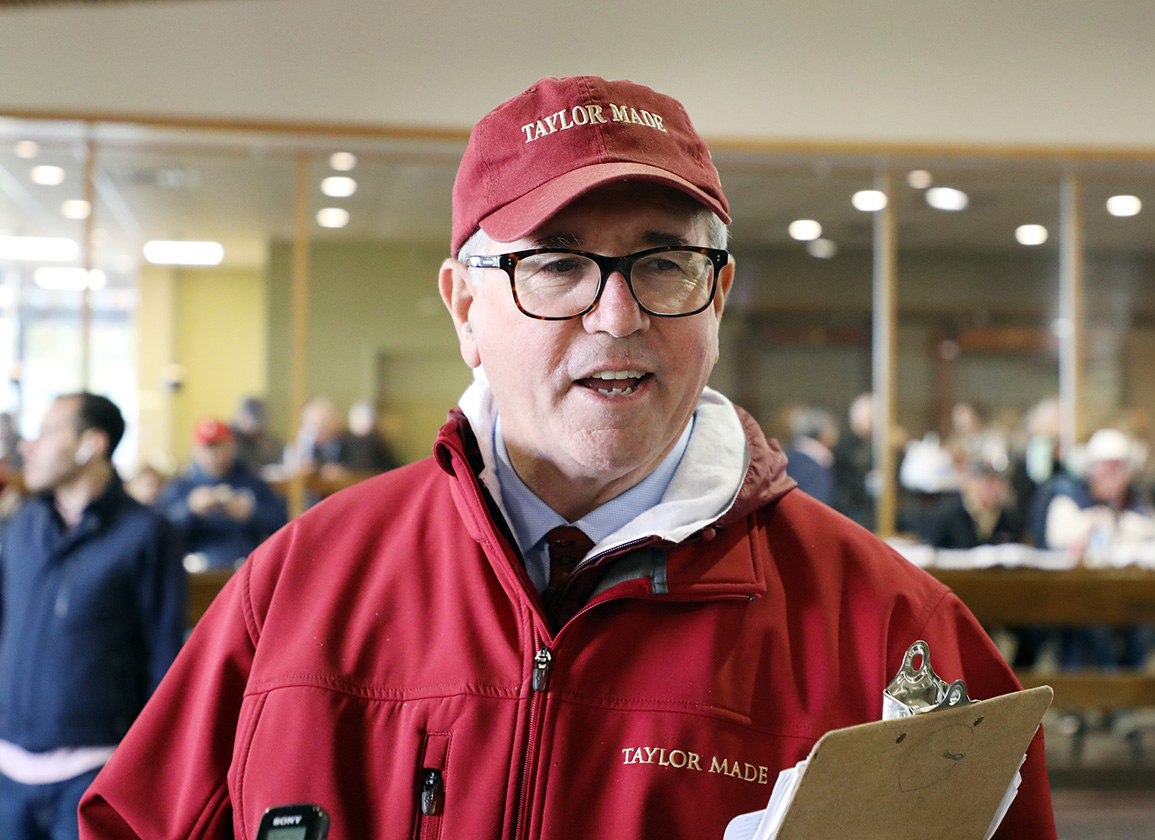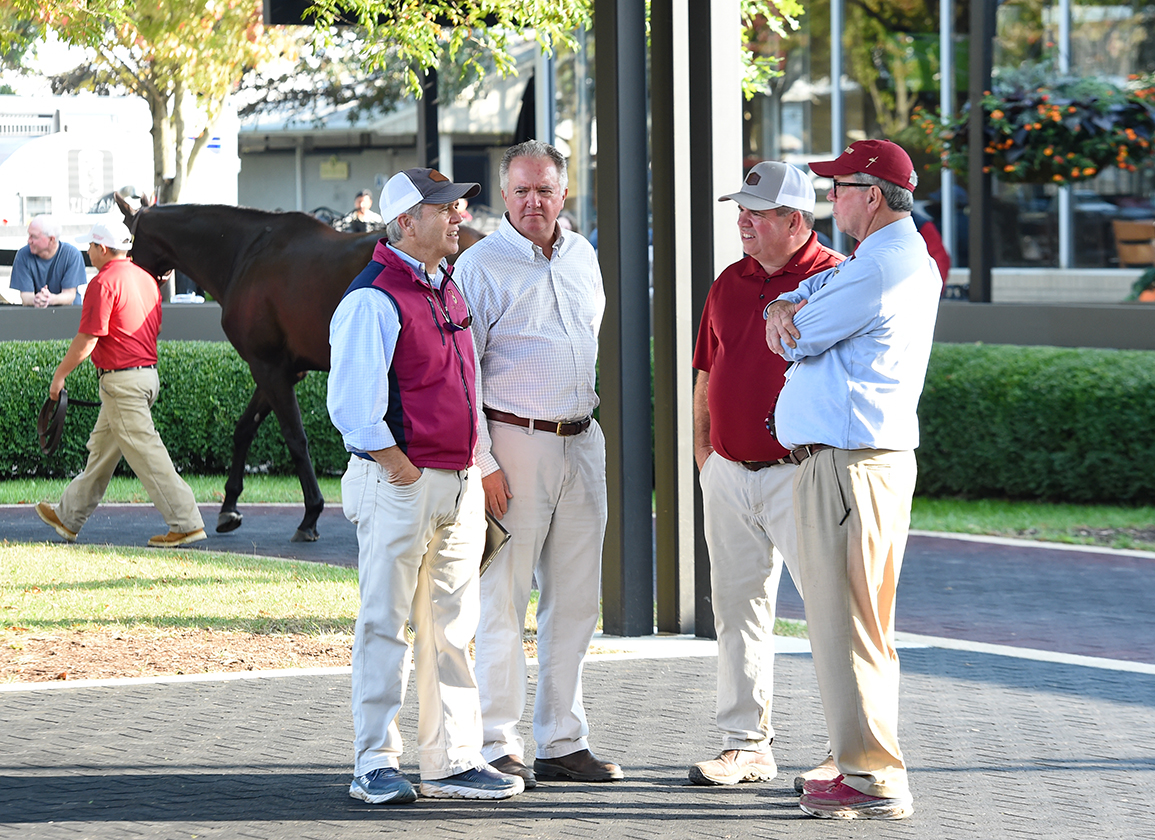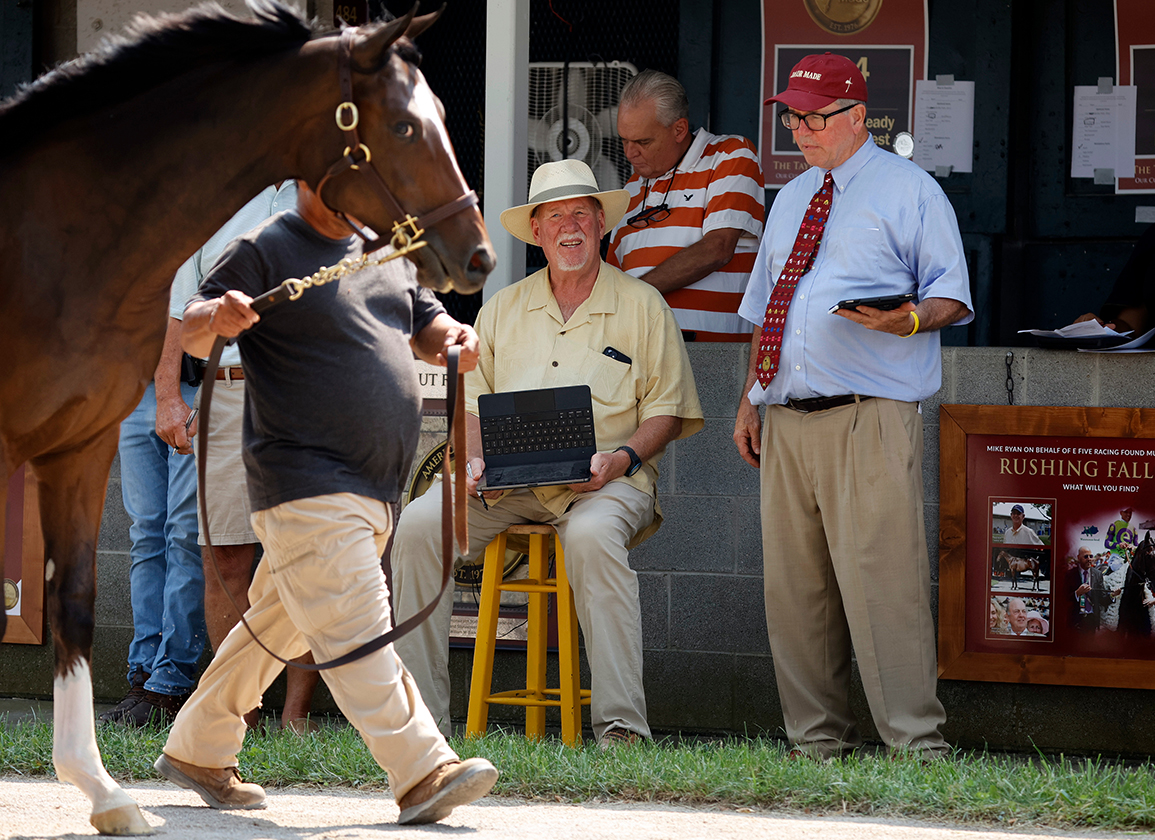By Chris McGrath
He always says that had he been born in Detroit, he would have gone into the automobile trade. In other words, whatever kind of horseman he might allow us to credit him, first and foremost he came into the world a businessman. Now that Duncan Taylor is stepping down from the helm of one of its most remarkable family concerns, then, the Bluegrass can count itself fortunate that fate instead applied his flair to a more literal type of horsepower.
True, the old school can't have been enamored by his every flourish. There was the famous occasion at the Keeneland November Sale, for instance, when a mare had been prematurely scratched by the veterinarians. Taylor, thinking fast as always, got onto the airfield across the street to see if anyone could trail a banner announcing that she had been reinstated in the sale. But he had tried a similar stunt a few years previously, at the Woodbine Breeders' Cup, when he was repatriating A. P Jet from Japan.
“That horse didn't run well on the grass but he ran, like, 1:08 for six furlongs on dirt,” Taylor recalls. “So I hired this plane to fly a banner saying 'A. P Jet 1:08-and-change' over the crowd. Well, the guy flew so high you could hardly see it. I paid him his money, but I'd learned my lesson. So this time I sat down with this pilot and said: 'Now I don't want you flying up there where nobody can read it, you need people to be able to see what the hell all this is about.' Well, I don't know what kind of plane he had, but it sounded like a 1955 tractor. It was popping and spewing and sputtering, and he was swooping over the barns, back and forth, and everybody's horses were going crazy. And Mike Cline from Lane's End ran over and said: 'Duncan take that damned plane down! I'll buy your damned horse from you before you kill all mine!'”
Nor was that the only time Taylor reached for the stars in his publicity. With an important dispersal going through his barn, another November, he rented a plane to get the big spenders back from the Breeders' Cup at Gulfstream, dressing up in a pilot's uniform to record a video wishing everyone a comfortable flight.
It's not as though such literal flights of fancy directly account for the giddy evolution of Taylor Made, from its unobtrusive foundation in 1976 when Taylor was still only 19, into so dominant a force that its consignment has ranked No 1 in a staggering 26 years of the past 28, while processing $2.7 billion of bloodstock. But his receptivity to innovation and experiment–undiminished even as he hands over to his brother Mark, as CEO, and embraces a new role as Senior Thoroughbred Consultant–has pioneered many of the services nowadays taken for granted on the sales ground.
“You know, one of the things I've found in business–and in life–is that if you don't start on the course of trying to do something better, then you never get the benefit of other opportunities that emerge along the way,” he reflects. “Opportunities that are often better than the things you originally set out trying to do. And that's about the force of human passion. When people start driving towards something, good things start to happen.”
As is often true of Taylor's perspectives, this one dovetails with his Catholic faith. “Because it's about hope,” he says. “When I was young I understood faith, and I understood charity. But hope? Where did that fit in? It was only as I got older that I understood how hope is really the greatest of the three. Because it's a real blessing if you can get up every morning and think, I need to get this done, that done, because you're always chasing that brighter future.”
Taylor Made has met two extremely delicate challenges during its perennial expansion. One was to maintain due intimacy with customers, even as the scale became ever more industrial, so that their slogan can still credibly remain: “With us, you're family.” The other was to maintain a vital equilibrium between fraternal affection, among Taylor and his brothers Mark, Frank, Ben, and their partner Pat Payne, and the hard-headed administration of what has become such a huge business.
Taylor stresses that he has “the best hard-working brothers and a tremendous business partner in Pat Payne.” But to have somehow always made it all work tells you much about their upbringing. Their mother Mary was a woman of iron faith; and “Daddy” Joe commanded respect across the Bluegrass not just for the horsemanship that sustained 40 years as farm manager at Gainesway—on which vocation he literally wrote the book—but also for the probity he demanded of his children. “Don't ever do anything you wouldn't want to read about in the Herald-Leader,” he reproved them.
“He would always try and help the underdog,” Taylor says. “In his early life he experienced the Depression. A lot of those people in that generation, they had really tasted poverty, and they were geared to make work central to their lives. Mom let my dad work as long hours as he needed, and always had a hot meal for him when he came home. And from the time we were just young boys, he was taking us with him and teaching us.
“Like any young kid, we weren't a lot of help at first. But by the time we were 10 years old most of us could drive a tractor; and by the time I was 14 or 15, I was about half a veterinarian for the cattle, I knew how to plow, if the tractor got dirt in the lines I knew how to bleed the lines. I thought, 'Man, I have to work all the time while my buddies are playing ball.' But that was just the way that my father operated.”
Taylor was already the fourth of what became eight children in what he humorously likes to describe as “the Catholic business plan.” But he would lose two of his brothers, in 1968 and 1981.
“And I think that also had something to do with how you can stick together, as a family, even when you have all the pressures of being in business together,” Taylor muses. “Yes, you can still fall out over little piddling stuff, that might not seem piddling at the time when everybody's emotions get high. But if you did get mad, you'd be over it the next day, didn't harbor any grudge.
“I was 12 years old when my older brother got killed in a car crash. My mother's faith kept her strong, but my dad was just all torn to pieces. I remember going out there with him, where the wreck had been, seeing him walk around saying: 'Oh man, why? Why did it have to happen?' And finally, he realised that he couldn't get it off his mind, so he went out to some old country roads in Jessamine County and bought 170 acres at $600 an acre. From then onwards, my sisters Emily or Mary Joe would haul us out there to work. They helped us greatly, by being the younger boys' transportation. If they didn't take us, then whatever time Daddy Joe clocked off at Gainesway, he came through and picked us up.”
They were set to work on the tangled wire fences, the fallen trees, the dilapidated barn. And that site eventually became the cornerstone of the little operation started by Taylor with his buddy Mike Shannon, a Texas schoolteacher working at Gainesway who had resolved to start a boarding farm.
“At that time of my life, I was just a kid with long hair. I was a hard worker, but if you saw me you'd think me a hippie,” Taylor recalls. “I was in U.K. and majoring in trying to get out. I had nine hours left and I quit. I'd saved up some money. When you worked for other farmers, you got paid! Cutting tobacco and baling hay, stuff like that. Mike and I both had a pick-up truck, and we put in our $10,000 apiece, and we started the farm.”
With Gainesway servicing its world-class stallion roster, Daddy Joe was sending mares to maybe a dozen different farms. The new venture received a couple mares and, between the oversight of the old man and the good work of the kids, gradually more followed. Mike also had a group of southwestern contacts sending us horses that helped us greatly in our early years.
“Mike taught me a lot,” stresses Taylor. “I was a shy kid, I'd never talked on the phone to an owner, but he just got me in there to finally get used to that. And he was a risk-taker, too: we bought some mares from John Nerud, spent about $125,000 when we didn't have any money. Breaking up that group and selling them gave us a bit more of a nest egg. And meanwhile we basically built up the farm one customer at a time. You know, I don't want to knock any other farm. But being broke and hungry, when I boarded a horse, that customer meant a lot more to me than if Leslie Combs boarded a horse. I didn't have Caro!”
Having initially rented a number of different tracts, they expanded a core for what has become a 1,600-acre footprint around the new land in Jessamine: if Taylor Made had to lease stalls, then they might as well pay their own family. The game-changer, however, was a game-changer for the whole industry.
Tomorrow: Part II: Ideas, and more ideas
Not a subscriber? Click here to sign up for the daily PDF or alerts.










